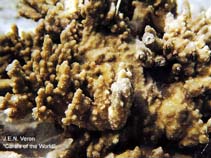Montipora dilatata Studer, 1901
Classification / Names Common names | Synonyms | CoL | ITIS | WoRMS
Hexacorallia | Scleractinia | Acroporidae
Environment: milieu / climate zone / depth range / distribution range Ecology
Reef-associated. Tropical; 23°N - 18°N, 161°W - 154°W (Ref. 846)
Distribution Countries | FAO areas | Ecosystems | Occurrences | Introductions
Eastern Central Pacific: Endemic to Hawaii.
Length at first maturity / Size / Weight / Age
Maturity: Lm ? range ? - ? cm Max length : 30.0 cm COLD male/unsexed; (Ref. 846)
Short description Morphology
Life cycle and mating behavior Maturity | Reproduction | Spawning | Eggs | Fecundity | Larvae
Main reference
References | Coordinator | Collaborators
Veron, J.E.N. 2000 Corals of the world. Volume 1. Australian Institute of Marine Science and CRR Qld. Pty. Ltd. Australia. 463 p. (Ref. 846)
IUCN Red List Status
(Ref. 130435: Version 2025-1)
CITES status (Ref. 108899)
CMS (Ref. 116361)
Threat to humans
Human uses
| FishSource |
Tools
More information
Diet composition
Food consumption
Predators
Max. ages / sizes
Length-weight rel.
Length-length rel.
Length-frequencies
Mass conversion
Abundance
Internet sources
BHL | BOLD Systems | CISTI | DiscoverLife | FAO(Publication : search) | Fishipedia | GenBank (genome, nucleotide) | GloBI | Gomexsi | Google Books | Google Scholar | Google | PubMed | Tree of Life | Wikipedia (Go, Search) | Zoological Record



